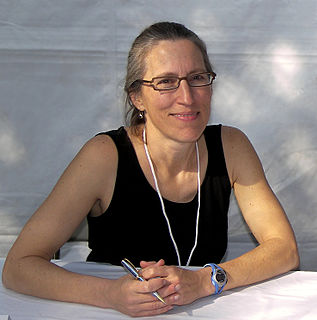A Quote by Barbara Taylor Bradford
It's different when the person you love dies. There's an awful finality to death. But it is final. The end. And there's the funeral, family gatherings, grieving, all of those necessary rituals. And they help, believe me. When the object of your love just disappears, there's no way to deal with the grief and pain.
Related Quotes
Grief causes you to leave yourself. You step outside your narrow little pelt. And you can’t feel grief unless you’ve had love before it - grief is the final outcome of love, because it’s love lost. […] It’s the cycle of love completed: to love, to lose, to feel grief, to leave, and then to love again. Grief is the awareness that you will have to be alone, and there is nothing beyond that because being alone is the ultimate final destiny of each individual living creature. That’s what death is, the great loneliness.
Small things such as this have saved me: how much I love my mother — even after all these years. How powerfully I carry her within me. My grief is tremendous but my love is bigger. So is yours. You are not grieving your son’s death because his death was ugly and unfair. You’re grieving it because you loved him truly. The beauty in that is greater than the bitterness of his death.
The problem, Mitch, is that we don't believe we are as much alike as we are. Whites and blacks, Catholics and Protestants, men and women. If we saw each other as more alike, we might be very eager to join in one big human family in this world, and to care about that family the way we care about our own. But believe me, when you are dying, you see it is true. We all have the same beginning - birth - and we all have the same end - death. So how different can we be? Invest in the human family. Invest in people. Build a little community of those you love and who love you. Morrie Schwartz
The heart that loves must one day grieve. Love and grief are the Goddess's twined gifts. Let the pain in, let it open your heart to compassion. Let me help you bear your grief and then may your heart ease and open to greater love. May the love that flows eternally through the universe embrace and comfort you. p.85
Have you ever experienced a pain so sharp in your heart that it's all you can do to take a breath? It's a pain you wouldn't wish on your worst enemy; you wouldn't want to pass it on to anyone else for fear he or she might not be able to bear it. It's the pain of being betrayed by a person with whom you've fallen in love. It's not as serious as death, but it feels a whole lot like it, and as I've come to learn, pain is pain any way you slice it.
While Christianity was able to agree with pagan writers that inordinate attachment to earthly goods can lead to unnecessary pain and grief, it also taught that the answer to this was not to love things less but to love God more than anything else. Only when our greatest love is God, a love that we cannot lose even in death, can we face all things with peace. Grief was not to be eliminated but seasoned and buoyed up with love and hope.
A faithful person sees life from the perspective of trust, not fear. Bedrock faith allows me to believe that, despite the chaos of the present moment, God does reign; that regardless of how worthless I may feel, I truly matter to a God of love; that no pain lasts forever and no evil triumphs in the end. Faith sees even the darkest deed of all history, the death of God's Son, as a necessary prelude to the brightest.
Grief is neither a disorder nor a healing process; it is a sign of health itself, a whole and natural gesture of love. Nor must we see grief as a step toward something better. No matter how much it hurts-and it may be the greatest pain in life-grief can be an end in itself, a pure expression of love.
Sweet is true love though given in vain, in vain;
And sweet is death who puts an end to pain:
I know not which is sweeter, no, not I.
Love, art thou sweet? then bitter death must be:
Love, thou art bitter; sweet is death to me.
O Love, if death be sweeter, let me die.
...
I fain would follow love, if that could be;
I needs must follow death, who calls for me;
Call and I follow, I follow! let me die.
I believe in love. And beauty. I believe that every single person has something they find beautiful and that they truly love. The smell of their child's hair, the silence of a forest, their lover's crooked grin. Their country, their religion, their family. And I believe that if you follow this love all the way to its end, if you start with the thing you find most beautiful and trace it's perfume back to its essence, you will perceive an intangible presence, a swath of stillness that allows the thing you love to be visible like the openness of the sky reveals the presence of the moon.
Everything is just make believe. They're just different versions of make believe. I love the period of this movie [The Finest Hours]. I love the '40s. I love the '50s. I love the style of the clothes. I love how the women looked. I love the dances. I love the music. I love the amber of the lights and the cars. I'm in love with all of it.







































